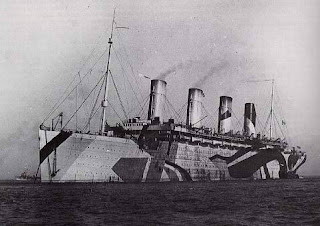“The 85th Battalion Band Concert Party is coming to town Saturday night to put on ‘The Old Homestead’ at the Celtic Hall. This is the same company and the same play that used to keep the boys of the Highland Brigade in good spirits behind the lines in France, and is well worth taking in. The 85th party has been touring the province during the past few weeks and the provincial papers speak of the performance as a wonderful exhibition.”
During the post-war years, the former 85th Band renewed its affiliation with the 78th Pictou Highlanders. Still under the direction of Dan Mooney, the group included members from several Pictou communities, although Stellarton still provided its core. The band played annually at the Pictou Highlanders summer camp until “depression years” budget cuts drastically reduced militia funds. In 1923, the band performed at the 150th anniversary celebrations of the ship Hector’s arrival, and was a popular attraction at local skating rinks, Sunday night theatre concerts, political rallies and various holiday festivities.
By 1939, Dan Mooney and a half-dozen pre-1914 members—including Harry Murray—were still part of the band. While a summer fire destroyed the Stellarton rink and the adjoining band headquarters, two members bravely rescued the band’s larger silver instruments and musical collection, the only losses being a set of bells and a baritone horn.
When Canada declared war on Germany in August 1939, the 85th’s former CO, James L. Ralston—now National Minister of Defence in Prime Minister William Lyon Mackenzie King’s Liberal government—contacted Harry with a special request. Could he gather any ex-85th band members willing to serve and bring them to the newly established Infantry Training Depot at Aldershot?
During the summer of 1940, Harry assembled four former members, added a contingent of younger musicians, and headed to camp, enlisting for military service on August 27, 1940. Sadly, Harry and his former 85th comrades, well into mid-life, married with children and civilian careers, no longer possessed the energy of their former military days. Harry was discharged as “physically unfit” on July 12, 1941—not a surprising judgment, considering that he was 57 years old at the time—and, as with his former 85th band mates, returned home. After the Second World War, the 78th band gradually faded into history, largely due to its members’ age, family and work commitments.
By that time, Harry was similarly committed to work and family. During the 1920s, he operated a candy store in Stellarton, in addition to playing bass in a silent movie orchestra. Throughout the summer months, the group performed at the Digby Pines resort hotel.
Harry’s single life came to an end on June 18, 1924, when the 40-year-old bachelor married Jean Blackwood Dick, age 26, a native of Joggins Mines and trained nurse. The couple subsequently welcomed two children into their family, a daughter, Jeanne, and a son, Robert “Bob.” During these years, Harry managed Stellarton’s Jubilee Theatre and Westville’s Roxie Theatre, all the while continuing to perform with the 78th band and on stage, whenever the opportunity arose.
During the “depression years,” Harry worked for a time on road-building crews. In 1938, he obtained a position as caretaker for New Glasgow’s Provost Street post office. The job included accommodations in an apartment located on the building’s upper floor. Harry worked there until retirement, at which time the family relocated to a home in New Glasgow.
 |
| Harry and Jean Murray on the occasion of their 40th wedding anniversary |
Harry Murray passed away at New Glasgow in 1974, at 90 years of age. The Stellarton community band played “Colonel Bogey’s March” during the interment ceremony at Heatherdale Cemetery, Alma, a fitting tribute to a man who enthusiastically combined a passion for music and entertainment with dedicated service to his country.
*****
The following sources provided information for this blog’s supporting posts:
Cameron, James M.. “Stellarton, the Birthplace of the First War’s 85th Band.” New Glasgow Evening News, no date indicated.
Hayes, Lt. Col. Joseph. The 85th In France & Flanders. Halifax: Royal Print & Litho Ltd., 1920. Available online.
https://archive.org/details/eightyfifthinfra00hayeuoft
Hunt, M. S.. “The 85th Battalion Brass & Reed Band. Nova Scotia’s Part in the Great War. Halifax, NS: The Nova Scotia Veteran Publishing Co., Ltd., 1920. Available online.
https://archive.org/details/novascotia00huntuoft
War diary of the 85th Canadian Infantry Battalion, CEF. Library & Archives Canada, Ottawa. Available online.
http://data4.collectionscanada.ca/netacgi/nph-brs?s1=85th+Battalion&s13=&s12=&l=20&s9=RG9&s7=9-52&Sect1=IMAGE&Sect2=THESOFF&Sect4=AND&Sect5=WARDPEN&Sect6=HITOFF&d=FIND&p=1&u=http://www.collectionscanada.gc.ca/archivianet/02015202_e.html&r=1&f=G
A special thank you to Robert “Bob” Murray, Antigonish, who provided supporting photographs, along with information on Harry’s family background and post-war life.
The entries from “Harry’s 85th Diary” are the property of Robert “Bob” Murray, Antigonish, NS and are reproduced on this blog by permission. All other rights are reserved. Any further publication, reproduction or distribution of this blog’s content without express permission is strictly prohibited.










